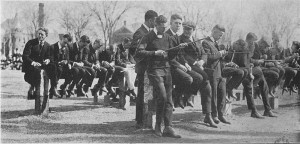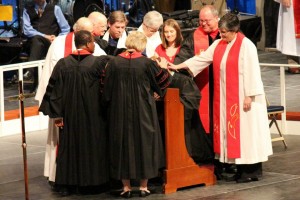It’s easy to gripe about Annual Conference. Too easy. Uncomfortable seats, long drives, longer hours, the Bishop can’t see people standing up waiting to speak at the microphones, the drums are too loud, there aren’t enough drums…. I am not immune to the complaining.
I often imagine a wonderful retreat-like locale, where we could spread out in time and space and really be together. I picture walking across a green campus to a dining hall for breakfast and I wonder how the tone of our annual gathering would change if we were “there” when we got there — no more driving in long snaking lines out to lunch and dinner, no more traipsing back to the hotel dead tired late at night then rushing to get a parking space in the morning. If we held our Annual Conference at a place like Lake Junaluska, would we hold it differently? Would it be less of a Christiany business meeting with pre-planned entertainment and stunts? Would it be more spacious and leisurely and would we actually participate in the holy part of holy conferencing?

So much better than a convention center. A girl can dream, right?
One of the most-anticipated parts of Annual Conference each year are the resolutions. These are submitted in advance and are usually pleas for our church to make a statement about something like fracking or predatory lending. They often anticipate an upcoming General Conference (the international United Methodist gathering every four years) and they are aimed at changing our polity or our church’s stance or statement on a particular issue.
As with much of the church, our corner of United Methodism is in constant conversation about sexuality issues. One of this year’s resolutions was about same sex marriage, though we never talked about the resolution itself. We spent the measly half hour allotted to discuss whether or not to discuss it right then or put it off for a year.
At the opening of Conference our Bishop announced a series of conversations that will be held during this next year, opportunities to delve prayerfully over time into issues around sexuality and the church. When it came time for resolutions, someone made a motion to put off talking about the submitted same sex marriage resolution in favor of the prayerful conversation model being put forth by the Bishop. That’s what we spent our half hour deciding and that’s what passed: we will engage in conversations throughout the conference and throughout the year.
I’m not going to complain about that decision or about the way we handle resolutions generally. I want to talk about conversation.
We have an opportunity to get to know one another better and to listen to the pain and promise in each other’s stories. How do we prepare ourselves to listen well, faithfully, lovingly? How do we listen when we don’t like what we are hearing? How do we listen without immediately, simultaneously, making ready our response? When we are certain of the ethics and theology, how do we listen to contradictory views? When we are in conversation with someone who is undecided, how to we engage with her as a person rather than another number to win to our side?
I don’t envy those who will organize and moderate these conversations. It’s a tough job that deserves to be done well. They are long overdue so people on all sides are raring to go, or at least to speak. I wonder how the moderators will approach the process. Are we trying to get one another to agree or to agree a little more? Are we merely trying to “take the temperature” of this corner of United Methodism? Will we report on the tenor of the conversations in order to assess where we are or are they meant as preamble to the one we put off and may have next year at Conference? How will we encourage people to participate? How will we facilitate deep, prayerful listening without shutting down passionate and pent up emotion?
I know where God has led me on these issues and where I hope our church will eventually go. I don’t know how to get us there and I don’t have many answers for the questions I’m posing here.
I do have a few suggestions on how to proceed during this next year in Virginia:
Hold at least one conversation in every district of our conference. It should be easy to get to a conversation nearby. Allow and encourage folks to attend any/all that are convenient for them (not just the one(s) in their district).
Hold them on different days and in every month between now and our next Annual Conference. Do not make assumptions about when people have time off or time to fit this in. Again, if should be easy to make it to at least one conversation. Hold them on Saturdays and weekdays. Hold them during the day and in the early evening.
Require all members of Annual Conference (clergy and laity) to attend at least one conversation. If we achieve an amazing conversational turnout (like half of all United Methodists in the Virginia Conference) but only half of those folks actually attend Annual Conference next June, we still aren’t having the same conversation. If this is important enough to spend the year on, make it a requirement for attending Annual Conference as a member.
Publicize the conversations themselves (when and where) and some of what’s coming out of them. Make it a media blitz and one of the communication strategies for our conference in the coming year so there is no excuse for being unaware of or uninvolved in this. Use the email lists, conference website, Facebook, Twitter, e-Advocate, and The Advocate (to name a few) to consistently hold this up as something we are spending time on together.
Arrange the Bible study sessions of Annual Conference around this topic. Our Book of Discipline makes it clear how we as United Methodists read scripture. This doesn’t mean we will all understand every passage in the same way but it does rule out some lazy scholarship and incendiary off-base “readings.” Help us, as a group, to read together in the context of this ongoing conversation. Give the gathered body this grounding so that when someone veers off course, the Bishop or another moderator can gently guide them back with authority and in the context of an explicitly shared understanding of scripture. At the very least, then we’d all be talking about the same thing when we talk about “what the Bible says.”
Pray. Without prayerful and open hearts we won’t get anywhere. We need more than our own experiences, theologies, and interpretations — no matter how faithful and hard won. We need God’s Spirit to breathe in us and inspire the conversation.
Part of me dreads this conversation because I’ve been having it for more than 25 years now. But I’m going to practice patience and listening and engage in it as well as I am able…Take a deep breath. Listen. Take part in the conversation. May the Breath of God disrupt our usual conversations and inspire every moment.
*
photo credit: “Lake Junaluska,” © 2010 by justinknabb, CC BY-SA 2.0













